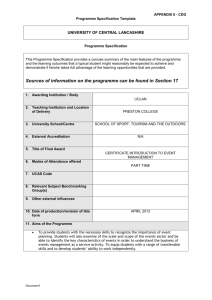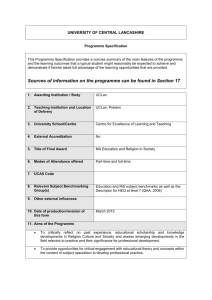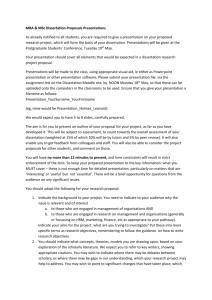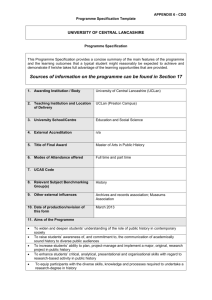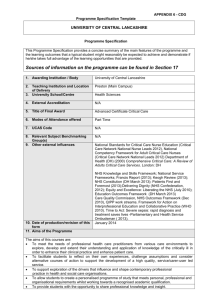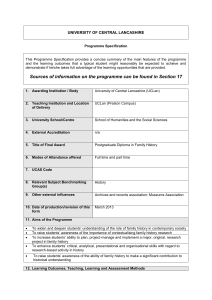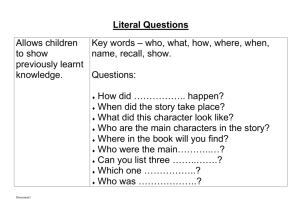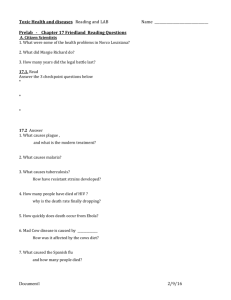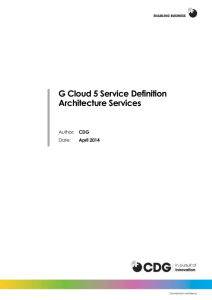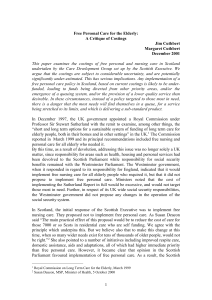MA Education with Languages (Sept 2013)
advertisement
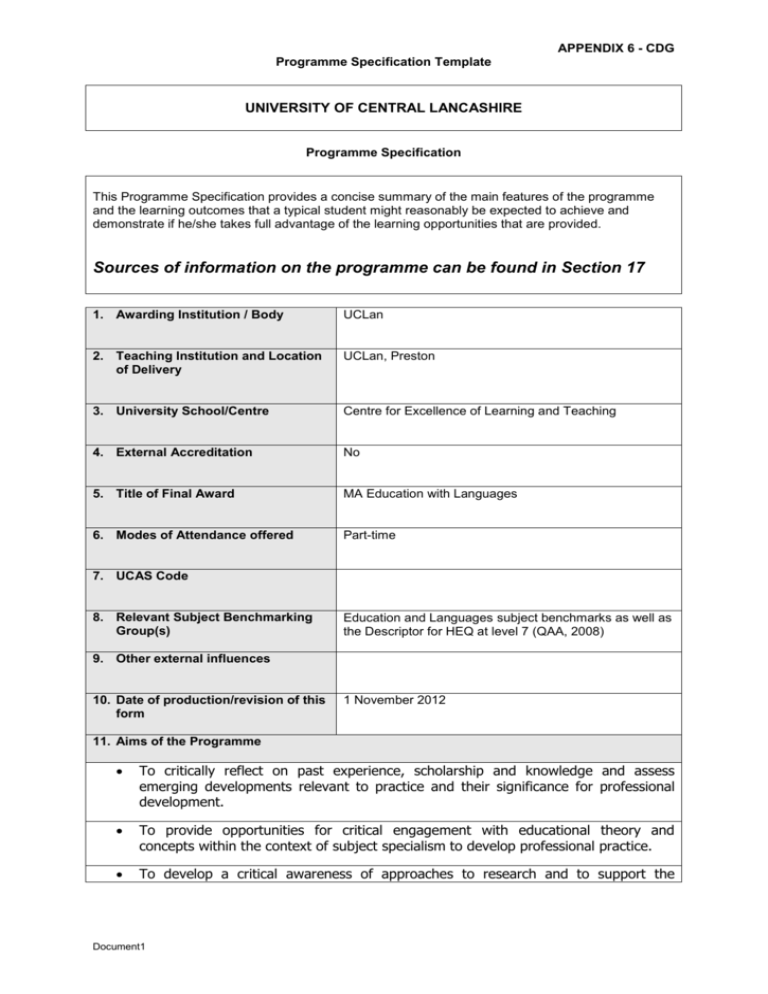
APPENDIX 6 - CDG Programme Specification Template UNIVERSITY OF CENTRAL LANCASHIRE Programme Specification This Programme Specification provides a concise summary of the main features of the programme and the learning outcomes that a typical student might reasonably be expected to achieve and demonstrate if he/she takes full advantage of the learning opportunities that are provided. Sources of information on the programme can be found in Section 17 1. Awarding Institution / Body UCLan 2. Teaching Institution and Location of Delivery UCLan, Preston 3. University School/Centre Centre for Excellence of Learning and Teaching 4. External Accreditation No 5. Title of Final Award MA Education with Languages 6. Modes of Attendance offered Part-time 7. UCAS Code 8. Relevant Subject Benchmarking Group(s) Education and Languages subject benchmarks as well as the Descriptor for HEQ at level 7 (QAA, 2008) 9. Other external influences 10. Date of production/revision of this form 1 November 2012 11. Aims of the Programme To critically reflect on past experience, scholarship and knowledge and assess emerging developments relevant to practice and their significance for professional development. To provide opportunities for critical engagement with educational theory and concepts within the context of subject specialism to develop professional practice. To develop a critical awareness of approaches to research and to support the Document1 APPENDIX 6 - CDG Programme Specification Template planning and execution of a piece of research relevant to practice. To enhance key skills in data collection, analysis, academic writing and oral presentations. 12. Learning Outcomes, Teaching, Learning and Assessment Methods A. Knowledge and Understanding A1. To critically reflect on personal and professional development as a practitioner. A2. To evaluate and respond to current policy, literature and professional debates influencing the professional role. A3. To develop and update discipline knowledge. A4. To plan and execute a piece of research whilst demonstrating a critical appreciation of methodological and epistemological issues. Teaching and Learning Methods Teaching and learning methods will include lectures, seminars, guided research, group presentation skills and independent study as well as the use of Blackboard. Assessment methods The assessment methods will include academic essays, oral presentations, group presentations, oral and written exams, short answer questions, case study analysis research proposal, discussion boards and a dissertation. B. Subject-specific skills B1. Critically engage with relevant sources related to the study of Education and Languages demonstrating an understanding of how this can enhance professional practice. B2. Select valid and reliable methods of data collection and demonstrate critical understanding of their application and limitations where necessary to support the development of professional practice. B3. Process, analyse, synthesise and evaluate evidence from a range of sources to examine the relationship between theory, policy and practice. Teaching and Learning Methods Teaching and learning methods will include lectures, seminars, guided research, group presentation skills and independent study as well as the use of Blackboard. Assessment methods The assessment methods will include academic essays, oral presentations, group presentations, oral and written exams, short answer questions, case study analysis research Document1 APPENDIX 6 - CDG Programme Specification Template proposal, discussion boards and a dissertation. C. Thinking Skills C1. Deal with complex issues both systematically and creatively, make sound judgements in the critical analysis and evaluation of data, and communicate their conclusions clearly. C2. Exhibit autonomous learning and research skills in identifying and evaluating source materials. C3. Engage in debate and discussion surrounding specific issues raised within the programme, demonstrating conceptual understanding that enables evaluation and critical analysis. C4. Recognise own assumptions and standpoint and its impact on professional practice. C5. Demonstrate high level decision-making skills, professional judgement and problem solving skills necessary for working effectively in a complex and dynamic environment. Teaching and Learning Methods Teaching and learning methods will include lectures, seminars, guided research, group presentation skills and independent study as well as the use of Blackboard. Assessment methods The assessment methods will include academic essays, oral presentations, group presentations, oral and written exams, short answer questions, case study analysis research proposal, discussion boards and a dissertation. D. Other skills relevant to employability and personal development D1. Demonstrate an enhanced ability to reflect on professional practice in the context of relevant theory, concepts and policy. D2. Demonstrate the ability to initiate, negotiate and carry out independent learning showing self direction, autonomy and initiative in planning and implementing Masters level work. D3. Express, organise and articulate opinions and arguments through prose, visually and orally and to use ICT for locating, gathering and presenting data in a range of contexts. Teaching and Learning Methods Teaching and learning methods will include lectures, seminars, guided research, group presentation skills and independent study as well as the use of Blackboard. Assessment methods Document1 APPENDIX 6 - CDG Programme Specification Template The assessment methods will include academic essays, oral presentations, group presentations, oral and written exams, short answer questions, case study analysis research proposal, discussion boards and a dissertation. 13. Programme Structures* 14. Awards and Credits* Level Module Code Module Title Level 7 EH4106 The Critical Professional 20 EH4119 Developing Innovation in Teaching, Learning and Assessment 20 ED4995 Designing and Planning Your Research Project 20 ED4019 Dissertation EB4502 Methodology in TESOL EB4503 Credit rating 60 20 Second Language Acquisition 20 FR3001 French Language 20 GM3001 German Language 20 SH3001 Spanish Language 20 MA in Education with Languages requires 180 credits including a minimum of 160 credits at Level 7. PG Diploma in Education with Languages requires 120 credits including a minimum of 100 credits at level 7 and at least 2 modules in Languages. PG Certificate in Education with Languages requires 60 credits including a minimum of 40 credits at Level 7 and at least one module in Languages. 15. Personal Development Planning PDP is developed throughout the programme through the encouragement of personal reflection and self-awareness to help students to interrogate their own skills, progress and planning. The personal tutor, as well as helping more generally, will introduce such opportunities as the PDP portfolio, which students may choose to use to document their achievements and aims. Personal tutorials, for example to discuss assessment feedback, can be scheduled for students on individual and group basis throughout the taught element of the programme. There is also 6 hours of individual supervision built into the dissertation module. Students may also utilise the ESS and Combined Honours Personal Development Planning Document1 APPENDIX 6 - CDG Programme Specification Template Activities via Blackboard 16. Admissions criteria Programme Specifications include minimum entry requirements, including academic qualifications, together with appropriate experience and skills required for entry to study. These criteria may be expressed as a range rather than a specific grade. Amendments to entry requirements may have been made after these documents were published and you should consult the University’s website for the most up to date information. Students will be informed of their personal minimum entry criteria in their offer letter. Minimum: a second class honours degree in a relevant subject discipline or equivalent qualification. Students with non-traditional qualifications will be considered on a case-bycase basis. Applicants should be able to demonstrate evidence of teaching experience and knowledge of the appropriate Modern Foreign Language at B2 level of the Common European Framework or equivalent. Non-native speakers of English need to demonstrate a level of English broadly equivalent to a minimum of IELTS 6.5 with a minimum of 6 in Reading and Writing. Applicants must be able to produce original certificates to prove their English language level. Please note that A UCLAN English Language Examination at C1 is also available via the School of Language, Literature & International Studies. Forms and literature about studying in the United Kingdom are available from the British Council offices or British Embassies throughout the world. You can also find a lot of information about living and studying in the UK on the British Council’s website (www.educationuk.org). 17. Key sources of information about the programme University Website, School of Education and Social Science website Programme Handbook Undergraduate Education subject Benchmarks Undergraduate Languages subject Benchmarks Descriptor for HEQ at Level 7 (QCA, 2008) Document1 APPENDIX 21 - CDG 18. Curriculum Skills Map Please tick in the relevant boxes where individual Programme Learning Outcomes are being assessed Programme Learning Outcomes Core (C), Compulsory Module (COMP) or Knowledge and Subject-specific Level Code Module Title Option (O) understanding Skills Thinking Skills A1 A2 A3 C X x X C x x A4 B1 EH4106 The Critical Professional x B2 B3 x X C1 Other skills relevant to employability and personal development C2 C3 C4 C5 D1 D2 D3 x X X X X X X x X X X X x x X e.g. LEVEL 6 & 7 EH4119 Developing Innovation in TLA x Designing and Planning Your ED4995 Research Project x x x x C ED4019 Dissertation x x x French Language C O x FR3001 X x X x GM3001 German Language O X X X X X x x X x x X x X x X X X X X X x X x X X x x x x x x X x x x x x x X x x x X x Note: SH3001 Spanish Language O x X x EB4502 Methodology in TESOL C X x x x EB4503 Second Language Acquisition C x x x x X x x Mapping to other external frameworks, e.g. professional/statutory bodies, will be included within Student Course Handbooks document1
